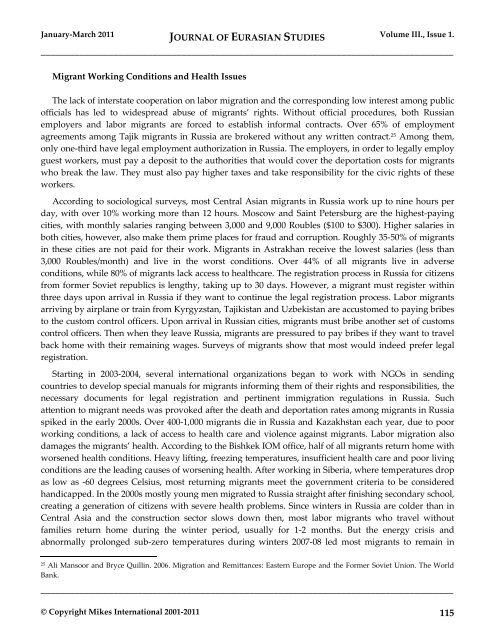JOURNAL OF EURASIAN STUDIES
JOURNAL OF EURASIAN STUDIES
JOURNAL OF EURASIAN STUDIES
You also want an ePaper? Increase the reach of your titles
YUMPU automatically turns print PDFs into web optimized ePapers that Google loves.
January-March 2011 <strong>JOURNAL</strong> <strong>OF</strong> <strong>EURASIAN</strong> <strong>STUDIES</strong> Volume III., Issue 1.<br />
_____________________________________________________________________________________<br />
Migrant Working Conditions and Health Issues<br />
The lack of interstate cooperation on labor migration and the corresponding low interest among public<br />
officials has led to widespread abuse of migrants’ rights. Without official procedures, both Russian<br />
employers and labor migrants are forced to establish informal contracts. Over 65% of employment<br />
agreements among Tajik migrants in Russia are brokered without any written contract. 25 Among them,<br />
only one-third have legal employment authorization in Russia. The employers, in order to legally employ<br />
guest workers, must pay a deposit to the authorities that would cover the deportation costs for migrants<br />
who break the law. They must also pay higher taxes and take responsibility for the civic rights of these<br />
workers.<br />
According to sociological surveys, most Central Asian migrants in Russia work up to nine hours per<br />
day, with over 10% working more than 12 hours. Moscow and Saint Petersburg are the highest-paying<br />
cities, with monthly salaries ranging between 3,000 and 9,000 Roubles ($100 to $300). Higher salaries in<br />
both cities, however, also make them prime places for fraud and corruption. Roughly 35-50% of migrants<br />
in these cities are not paid for their work. Migrants in Astrakhan receive the lowest salaries (less than<br />
3,000 Roubles/month) and live in the worst conditions. Over 44% of all migrants live in adverse<br />
conditions, while 80% of migrants lack access to healthcare. The registration process in Russia for citizens<br />
from former Soviet republics is lengthy, taking up to 30 days. However, a migrant must register within<br />
three days upon arrival in Russia if they want to continue the legal registration process. Labor migrants<br />
arriving by airplane or train from Kyrgyzstan, Tajikistan and Uzbekistan are accustomed to paying bribes<br />
to the custom control officers. Upon arrival in Russian cities, migrants must bribe another set of customs<br />
control officers. Then when they leave Russia, migrants are pressured to pay bribes if they want to travel<br />
back home with their remaining wages. Surveys of migrants show that most would indeed prefer legal<br />
registration.<br />
Starting in 2003-2004, several international organizations began to work with NGOs in sending<br />
countries to develop special manuals for migrants informing them of their rights and responsibilities, the<br />
necessary documents for legal registration and pertinent immigration regulations in Russia. Such<br />
attention to migrant needs was provoked after the death and deportation rates among migrants in Russia<br />
spiked in the early 2000s. Over 400-1,000 migrants die in Russia and Kazakhstan each year, due to poor<br />
working conditions, a lack of access to health care and violence against migrants. Labor migration also<br />
damages the migrants’ health. According to the Bishkek IOM office, half of all migrants return home with<br />
worsened health conditions. Heavy lifting, freezing temperatures, insufficient health care and poor living<br />
conditions are the leading causes of worsening health. After working in Siberia, where temperatures drop<br />
as low as -60 degrees Celsius, most returning migrants meet the government criteria to be considered<br />
handicapped. In the 2000s mostly young men migrated to Russia straight after finishing secondary school,<br />
creating a generation of citizens with severe health problems. Since winters in Russia are colder than in<br />
Central Asia and the construction sector slows down then, most labor migrants who travel without<br />
families return home during the winter period, usually for 1-2 months. But the energy crisis and<br />
abnormally prolonged sub-zero temperatures during winters 2007-08 led most migrants to remain in<br />
25 Ali Mansoor and Bryce Quillin. 2006. Migration and Remittances: Eastern Europe and the Former Soviet Union. The World<br />
Bank.<br />
_____________________________________________________________________________________<br />
© Copyright Mikes International 2001-2011 115

















